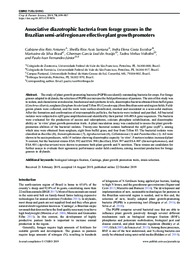Associative diazotrophic bacteria from forage grasses in theBrazilian semi-arid region are effective plant growth promoters.
Associative diazotrophic bacteria from forage grasses in theBrazilian semi-arid region are effective plant growth promoters.
Autoria: ANTUNES, G. dos R.; SANTANA, S. R. A.; ESCOBAR, I. E. C.; BRASIL, M. da S.; ARAUJO, G. G. L. de; VOLTOLINI, T. V.; FERNANDES JUNIOR, P. I.
Resumo: The study of plant growth-promoting bacteria (PGPB) can identify outstanding bacteria for crops. For forage grasses adapted to drylands, the selection of PGPB can increase the field performance of pastures. The aim of this study was to isolate, and characterise at molecular, biochemical and symbiotic levels, diazotrophic bacteria obtained from buffel grass (Cenchrus ciliaris), sorghum (Sorghum bicolor) and Tifton 85 (Cynodon spp.) from Brazilian semi-arid region fields. Fieldgrown plants were collected, and the roots were surface-disinfected, crushed and inoculated in a semi-solid medium. After the formation and confirmation of microaerophilic pellicles, the bacteria were isolated and purified. All bacterial isolates were subjected to nifH gene amplification and identified by their partial 16S rRNA gene sequences. The bacteria were evaluated for the production of auxins and siderophores, calcium phosphate solubilisation, and diazotrophic ability as ?in vitro? plant growth-promotion traits. A plant inoculation assay was conducted to assess the plant growth promotion abilities of the bacterial isolates. Twenty-one bacterial isolates harboured the nifH gene (nifH+), among which nine were obtained from sorghum, eight from buffel grass, and four from Tifton 85. The bacterial isolates were classified as Bacillus (8), Stenotrophomonas (7), Agrobacterium (4), Cellulomonas (1) and Paenibacillus (1). All were shown to be auxin producers, with 14 isolates showing diazotrophic capacity ?in vitro?. Fourteen isolates increased plant N content, but the bacterial strains ESA 392 and ESA 398 (Bacillus), ESA 397 and ESA 407 (Stenotrophomonas), and ESA 401 (Agrobacterium) were shown to promote both plant growth and N nutrition. These strains are candidates for further assays to evaluate their agronomic performance under field conditions, aiming inoculant production for forage grasses in drylands.
Ano de publicação: 2019
Tipo de publicação: Artigo de periódico
Unidade: Embrapa Semiárido
Observações
1 - Por padrão são exibidas publicações dos últimos 20 anos. Para encontrar publicações mais antigas, configure o filtro ano de publicação, colocando o ano a partir do qual você deseja encontrar publicações. O filtro está na coluna da esquerda na busca acima.
2 - Para ler algumas publicações da Embrapa (apenas as que estão em formato ePub), é necessário ter, no celular ou computador, um desses softwares gratuitos. Sistemas Android: Google Play Livros; IOS: iBooks; Windows e Linux: software Calibre.
Acesse outras publicações
Acesse a Base de Dados da Pesquisa Agropecuária (BDPA) para consultar o acervo completo das bibliotecas da Embrapa.

